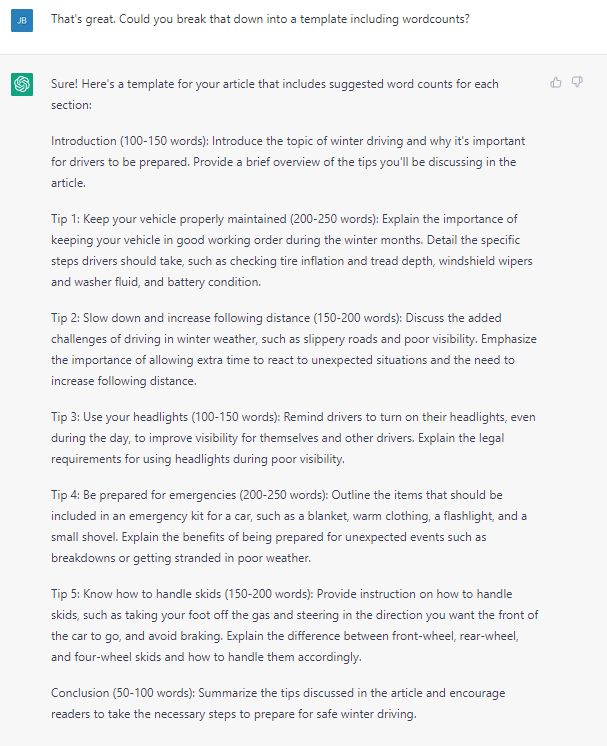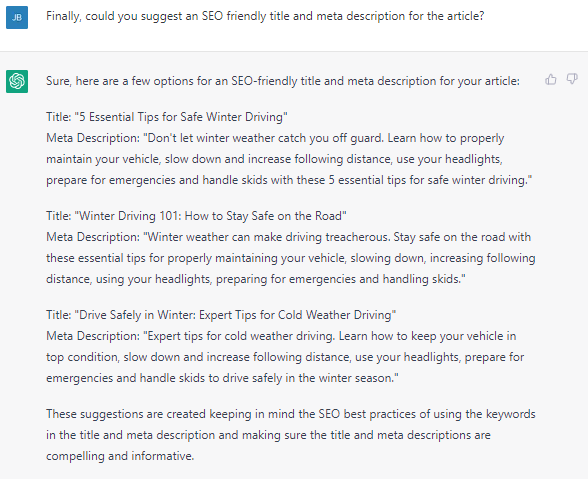The AI invasion is upon us! From generating artwork, to compiling a playlist for your morning commute, AI is making huge leaps forward that could make the human experience that little bit easier. The latest advancement comes in the form of ChatGPT, a helpful tool that can generate long-form, conversational responses to help with, well… pretty much everything.
In this article we’re going to discuss what ChatGPT is and what it means for UK brands, including practical uses that can be taken to help streamline productivity.
What is ChatGPT?
Simply put: Generative Pre-trained Transformer, or ChatGPT to its friends, is an AI that can answer long-form, complex questions conversationally.
The chatbot was launched by OpenAI in November 2022 and is built on top of the company’s GPT-3 family of language models, and is fine-tuned with supervised and reinforcement learning techniques; meaning that the AI can respond to queries in a humanlike, conversational manner.
Whether this turns into a JARVIS and Iron Man scenario or the beginning of Skynet is up for debate, however currently ChatGPT is proving to be a helpful tool when it comes to streamlining workflows and boosting productivity for brands across the country.
Here are five practical uses of ChatGPT for UK brands…
1. Planning
Whilst ChatGPT has the capability to write essays and long-form content, it’s generally best not to use it for this purpose at present – mainly considering that Google’s algorithms can detect AI generated content fairly reliably, as outlined in their recent helpful content update. However, a practical use of ChatGPT would be to help identify relevant themes and topics that could support your content strategy.
Let’s say you’ve been given a brief for an article but don’t know much about the topic, you can ask ChatGPT to outline some points to write about and begin building a template to form your copy. Below I asked ChatGPT to generate some bullet points for an article titled “5 Tips For Driving in Winter”:

ChatGPT generated five points for my article and even included some copy to explain them. I was happy with the results, but my new AI friend asked if they could help further. So, I asked ChatGPT to breakdown the generated points into a template with suggested word counts:

This time ChatGPT didn’t ask if it could be of further assistance but it was Monday morning and I needed the extra help. Finally, I asked my AI pal to suggest an SEO friendly title and meta description for the piece:

After suggesting some recommendations for my article’s metadata, ChatGPT AIsplained SEO best practices to me (rude, I do this for a living!). However, in the space of mere minutes, I had content for my article, a planned layout, and metadata to set me up for a morning of copywriting without having to use an ounce of brainpower!
Furthermore, ChatGPT could help formulate copy for product descriptions, informational web pages, and even social media content – alleviating some manpower and streamlining productivity.
2. Translate Content Into Multiple Languages
If you’re looking to expand your content into other regions, classically you would have to hire a translator. In more recent times you could use Google translate to do the job for you; however I’ve seen enough dodgy, misinterpreted tattoos on my peers to know that this isn’t always 100% accurate. ChatGPT can translate and write content in other languages without losing context, making the translation more accurate. To test this, I asked ChatGPT to translate the paragraph you just read into French, voilà:

3. Write or Explain Code
Whether you’re a master coder or a novice, bugs in code are bound to crop up from time to time; and instead of sifting through lines looking for the problem, you can set ChatGPT on the case to find the issue. Whilst it’s not a great idea to launch generated code onto a production server, ChatGPT can even write entire blocks of functional code snippets!
4. Analyse Data
Picture the scene, it’s Friday afternoon and you’ve got sheets and sheets of data to go through to report back to your clients; ChatGPT can help streamline this.
Through natural language processing and text clarification, ChatGPT can classify text data and even extract insights from unstructured data: including customer feedback, news articles, or social media.
ChatGPT can also generate informative summaries of data and even create visualisations, as well as identify patterns, correlations, and relationships within the data. It can also be used to predict future trends and outcomes based on historical data through regression analysis or time-series forecasting.
5. Automate customer inquiries
Due to the conversational nature of GPT-3.5, ChatGPT can be used to supercharge the chatbots on your site; meaning it can help existing chatbots understand unpredictable human inputs due to its massive training base. This technology is already powering customer support for companies such as Meta, Canva, and Shopify, and for good reason.
Firstly, the automation means that ChatGPT can handle common customer inquiries, which allows customer service workers to focus on urgent and more complex inquiries. ChatGPT also doesn’t need sleep, and doesn’t have any hobbies, meaning it can be available 24/7, helping service customers and users outside of regular business hours.
It can also provide consistent and accurate responses, meaning less miscommunications and more customer satisfaction. ChatGPT is immensely scalable as well, meaning that it can simultaneously handle a large number of customer inquiries. And as previously mentioned, ChatGPT is multilingual, allowing customers to submit their inquiries in a language that they’re more comfortable in.
JARVIS or Skynet?
“But you see, you just can’t differentiate between a robot and the very best of humans.” This may be the case in Isaac Asimov’s I, Robot but as it currently stands, I think we can postpone the AI apocalypse for now.
Whilst ChatGPT is incredibly impressive in terms of producing content and analysing data, it needs some serious human intervention to become a staple part of a brands’ marketing function. We predict that ChatGPT will require a further 12 months of development to reach a level whereby it’s crucial to SEO, and by that time Microsoft are likely to be using it to power the Bing search engine.
We’ll be monitoring this trend closely, and assessing whether brands should start optimising for Bing in the long term- however for now, investing into Google’s ad platforms and SEO practices is still the right move for revenue-hungry brands.
If you would like to discuss ChatGPT, or your current SEO function further, please get in touch with our team for a consultation.





